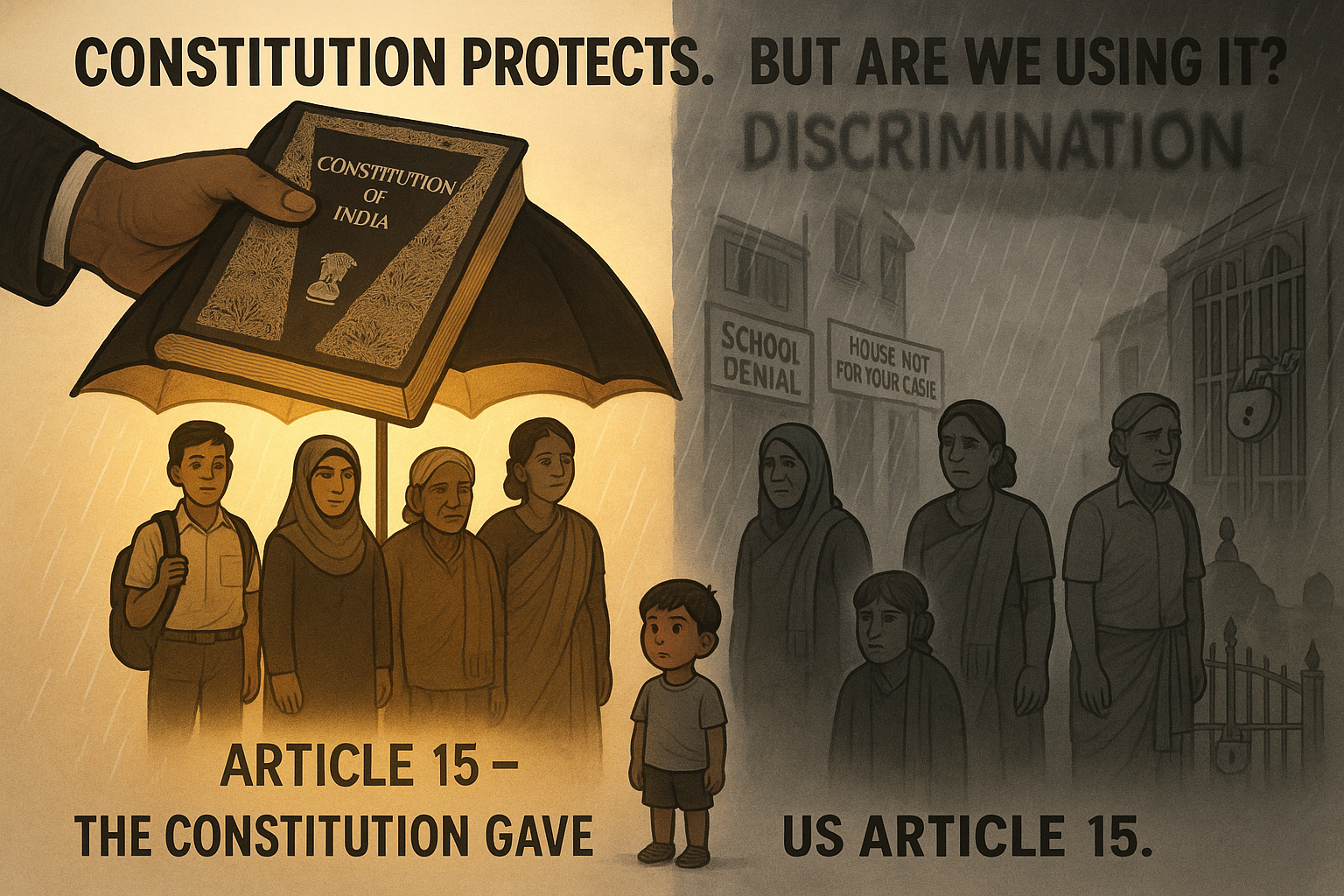⚖️ Article 15 – The Promise of Equality Still Waiting to Be Fulfilled!

𝑾𝒆 𝒕𝒉𝒆 𝒑𝒆𝒐𝒑𝒍𝒆 𝒐𝒇 𝑰𝒏𝒅𝒊𝒂 𝒈𝒂𝒗𝒆 𝒐𝒖𝒓𝒔𝒆𝒍𝒗𝒆𝒔 𝒕𝒉𝒊𝒔 𝑪𝒐𝒏𝒔𝒕𝒊𝒕𝒖𝒕𝒊𝒐𝒏… 𝑩𝒖𝒕 𝒂𝒓𝒆 𝒘𝒆 𝒕𝒓𝒖𝒍𝒚 𝒕𝒓𝒆𝒂𝒕𝒊𝒏𝒈 𝒆𝒂𝒄𝒉 𝒐𝒕𝒉𝒆𝒓 𝒆𝒒𝒖𝒂𝒍𝒍𝒚?”
What Is Article 15?
Article 15 of the Indian Constitution says the government must not discriminate against any citizen on the basis of religion, race, caste, sex, or place of birth.
It also allows the government to make special provisions for women, children, and socially & educationally backward classes to uplift those who have been historically oppressed.
What Does That Mean in Daily Life?
-
No discrimination in schools, government jobs, transport, public places like hotels, parks, or wells.
-
Everyone should get equal service, respect, and opportunity, regardless of background.
-
Equal access to laws, justice, and dignity.
But Is That Really Happening?
Despite 75+ years of independence, people still face discrimination daily.
Real Incidents That Show Article 15 Is Still a Struggle
-
Dalit Children Made to Clean Toilets in School
In Rajasthan and UP, multiple reports have surfaced where Dalit children are forced to clean school toilets, while upper-caste students are not. -
Denied Entry into Temples or Salons
In Tamil Nadu and Bihar, Dalit families were attacked for trying to enter temples. Some barbers refused to serve people from backward castes. -
Housing Discrimination in Cities
In many metro cities like Mumbai or Delhi, people are denied rental houses for being from a particular religion or caste. -
Women Denied Job Interviews
There are cases where women were rejected simply because they were pregnant or planning to marry — a clear gender bias.
Why This Is a Violation of Article 15
All these examples show direct or indirect discrimination, which Article 15 strictly prohibits.
But people often don’t raise their voice — either due to fear, lack of awareness, or assuming “nothing will change.”
So What Can You Do as a Citizen?
✅ Step 1: Know Your Right
You have the right to equal treatment, in:
-
Schools & colleges
-
Government services
-
Public transport
-
Housing
-
Shops and businesses
-
Social spaces (temples, hotels, libraries)
✅ Step 2: Document the Discrimination
-
Take photos/videos (if safe)
-
Record testimonies of witnesses
-
Keep copies of any written denial or statements
✅ Step 3: File a Complaint
-
Approach the National or State Human Rights Commission
-
File a case under SC/ST Prevention of Atrocities Act if caste-based
-
Approach the District Magistrate or Legal Aid Cell
-
File RTIs asking about action taken in such cases
-
Approach local media or NGOs
✅ Step 4: Spread Awareness
-
Share your story through social media
-
Mobilize others who’ve faced similar injustice
-
Demand sensitization programs in schools, government offices
Remember: Article 15 is Not Just a Sentence in a Book
It is a shield for the marginalized.
It is a mirror for our society.
It is a torchlight to call out darkness — wherever it hides.
If someone says: “This happens everywhere. Just adjust.”
You say: “No. We are protected by the Constitution. I have Article 15 on my side.”
Discrimination thrives in silence. But one voice of resistance can echo across generations. Use your right. Stand up — for yourself, or someone who cannot.
- Goa
- Jammu & Kashmir
- Punjab
- Uttar Pradesh
- Uttarkhand
- Andaman & Nikobar Islands
- Andhra Pradesh
- Karnataka
- Kerala
- Lakshdweep
- Puducherry
- Tamilnadu
- Telangana
- Dadra &Nager Haveli, Daman &Diu
- Himachal Pradesh
- Gujarat
- Madhya Pradesh
- Maharashtra
- Rajasthan
- Legal
- Life Style
- Music
- Prop News
- Sports
- Technology
- SURAKSHA
- Education
- International
- Haryana
- BMA
- Bharat
- Business
- Entertainment
- Fashion & Beauty
- Health & Fitness
- Arunachal Pradesh
- Assam
- Bihar
- Chattisgarh
- Jharkhand
- Ladakh
- Manipur
- Meghalaya
- Mizoram
- Nagaland
- Odisha
- Sikkim
- Tripura
- West Bengal
- Chandigarh
- Delhi - NCR
- Bharat Aawaz
- IINNSIDE
- Business EDGE
- Media Academy



